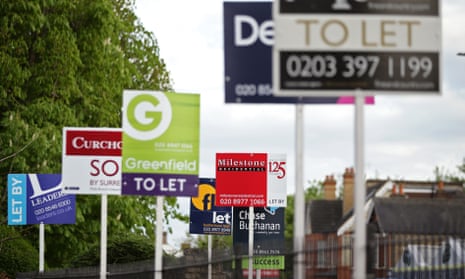The total amount of rent paid by tenants in Britain soared to more than £50bn in 2017, more than double the level of a decade ago, and may soon eclipse the entire sum paid out by homeowners for their mortgages.
The figures, compiled by the UK’s biggest estate agency and mortgage broker, Countrywide, reveal the dramatic reshaping of the property market in recent years as home ownership levels have gone into reverse.
Last year, tenants in Britain paid a record £51.6bn in rents, an increase of £1.8bn on the previous year and more than twice the £22.6bn shelled out in 2007.
Over the same period, the amount that home buyers are paying for their mortgages has fallen, from a peak of £63.8bn in 2008 to £57.4bn in 2017, as lower interest rates and cheap fixed-rate deals have benefitted buyers.
A breakdown of the figures reveals that the millennial generation, born between 1977 and 1995, are shouldering the largest part of the rise in rental costs. Countrywide estimated they spent £30.2bn on rent in 2017, or three times the £9.7bn paid in 2007.
With many tenants paying more than half their salary in rents, campaigners said rent controls are now urgently needed.
Dan Wilson Craw of Generation Rent said: “The private rental market has not only doubled in the past decade, but it is costing the economy more. With social housing unavailable and home ownership out of reach, millions of people have no option but to rent from a private landlord.
“This £30bn increase in the rent bill is money that people would rather be using to pay off their own mortgage or simply put food on the table.
“The government should be taking urgent action to bring down rents, by investing in new homes and bringing in rent control.”
Countrywide attributed the surge in overall rent being paid to increases in the number of households renting, and inflation-busting rent increases in most years. “Despite average rents falling in 2008, the total amount of rent paid by tenants has risen in every year for the last decade as the number of people renting has grown,” it said.
The latest English Housing Survey, published in January, found that 46% of 25-34 year olds now live in private rentals, compared with 27% in 2006-07. In London, private renting is now the most common form of tenure.
Home ownership levels peaked in the early 2000s, at 71% of households, but have fallen to 63% today, although the figure has levelled off in recent years.
The typical private tenant in England paid rent of £192 a week to their landlord in 2016-17, compared with £102 for tenants in the social and council house sector. In London, private rents average £309 a week compared with the £132 paid by council tenants.
The beneficiaries of the rental boom are likely to be buy-to-let landlords who have increasingly displaced first-time buyers over the past two decades. There are estimated to be around two million landlords in the UK, owning around 5m properties.
Analysis by the Council of Mortgage Lenders in December 2016 found that the average rental income earned by a buy-to-let landlord is around £20,000 a year, although the averages are skewed by a small number of landlords that own large portfolios of properties.
Ongoing tax changes, however, have put a brake on the rapid expansion of the buy-to-let market. Nationwide building society, whose The Mortgage Works arm is one of the biggest lenders to landlords, said last week that mortgage advances were down by a third on the year before.
Landlords are facing higher taxes on their rental incomes, additional stamp duty, and tougher lending criteria when applying for loans.

Comments (…)
Sign in or create your Guardian account to join the discussion